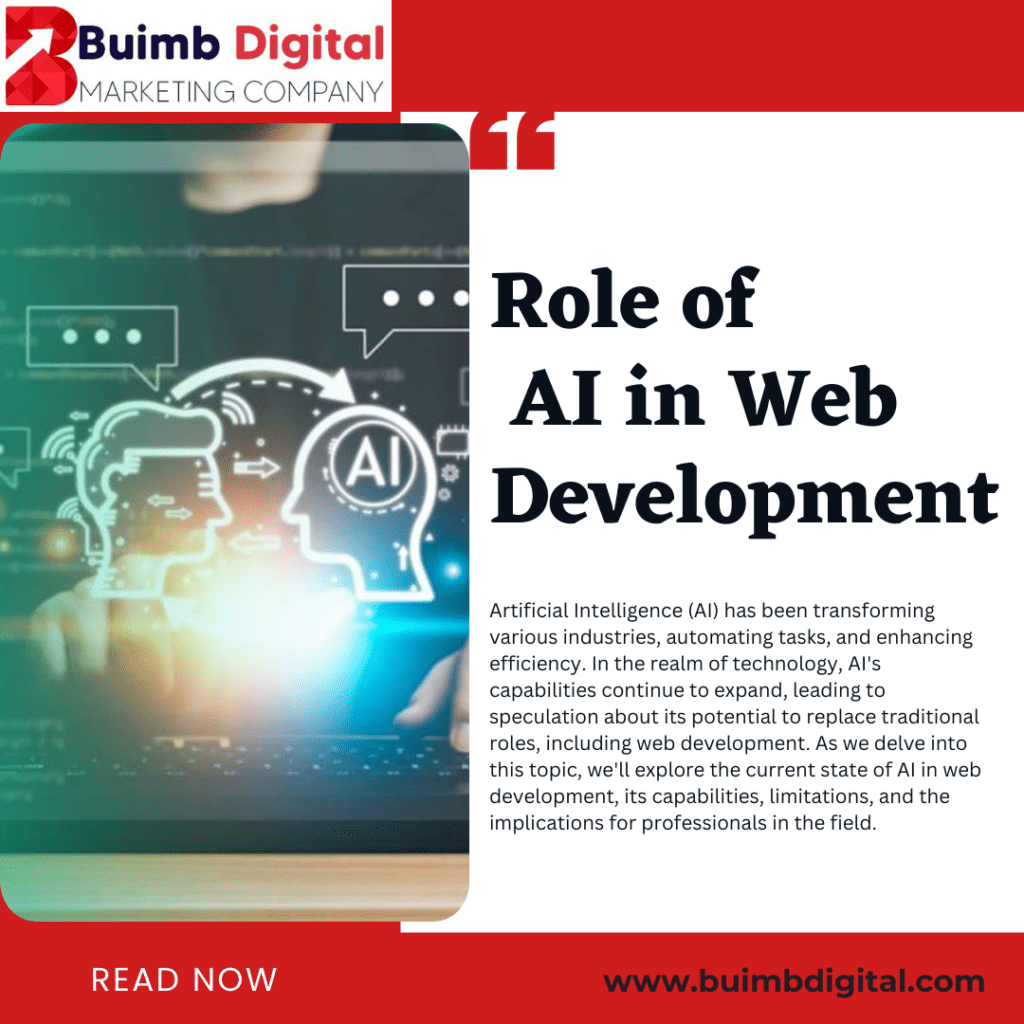Role of AI in Web Development?
Artificial Intelligence (AI) has been transforming various industries, automating tasks, and enhancing efficiency. In the realm of technology, AI’s capabilities continue to expand, leading to speculation about its potential to replace traditional roles, including web development. As we delve into this topic, we’ll explore the current state of AI in web development, its capabilities, limitations, and the implications for professionals in the field.

Understanding AI in Web Development
AI in web development refers to the use of machine learning algorithms and automated tools to streamline and assist in various aspects of creating, maintaining, and optimizing websites and web applications. These AI-powered tools can perform tasks such as:
- Code Generation: Automatically generating code based on design inputs or specifications.
- Design Assistance: Providing design suggestions, layout optimizations, and responsive design adjustments.
- Content Management: Analyzing content trends, creating personalized content, and managing content workflows.
- Testing and Debugging: Automating testing processes, identifying bugs, and optimizing performance.
- User Experience Enhancement: Analyzing user behavior data to optimize user interfaces and experiences.
These capabilities have sparked discussions about whether AI could potentially replace human web developers entirely or significantly diminish the need for their skills.
Current AI Tools and Technologies
Several AI-powered tools and platforms are already making waves in web development:
- Wix ADI (Artificial Design Intelligence): Wix uses AI algorithms to create websites based on user inputs, simplifying the design and development process.
- Grid.ai: This platform employs AI to design and build websites autonomously, adjusting layouts and elements based on user preferences and feedback.
- Google’s AutoML: While primarily used for machine learning models, AutoML and similar tools can potentially be adapted to automate certain aspects of web development.
- Content Management Systems (CMS): Platforms like WordPress are integrating AI to assist in content creation, SEO optimization, and user engagement.
While these tools are promising, they are currently limited to specific tasks within web development and are often used as aids rather than complete replacements for human developers.
The Role of Human Expertise
Despite the advancements in AI, human developers play indispensable roles in web development for several reasons:
- Creativity and Innovation: AI excels at repetitive tasks and pattern recognition but lacks creativity and the ability to innovate. Human developers bring unique insights, problem-solving skills, and creativity to design and develop unique solutions tailored to client needs.
- Complex Problem Solving: Web development often involves complex challenges that require critical thinking, strategic planning, and deep understanding of business goals. Human developers can navigate these complexities and make decisions that align with broader organizational objectives.
- Adaptability and Learning: AI tools are limited by their training data and algorithms. Human developers can continuously learn, adapt to new technologies and trends, and apply their knowledge in novel ways that AI may not anticipate.
- Ethical and Moral Considerations: AI decisions are based on algorithms and data, which may not always align with ethical considerations or user preferences. Human developers can incorporate ethical principles, user-centered design, and accessibility considerations into their work.
The Evolution of Web Development with AI
Rather than replacing human developers, AI is more likely to augment their capabilities and reshape the landscape of web development in several ways:
- Automation of Routine Tasks: AI can automate repetitive tasks such as code generation, testing, and content management, allowing developers to focus on higher-level strategic and creative aspects.
- Enhanced Efficiency and Productivity: By speeding up certain processes and providing insights based on data analysis, AI can help developers deliver projects faster and more efficiently.
- Improved User Experiences: AI’s ability to analyze user behavior data can lead to personalized experiences and optimized interfaces that enhance user engagement and satisfaction.
- Integration with Existing Tools: AI tools are increasingly being integrated into existing web development frameworks and platforms, offering developers additional capabilities without requiring them to learn entirely new systems.
Challenges and Limitations
Despite its potential benefits, AI in web development faces several challenges and limitations:
- Complexity of Creative Tasks: While AI can assist in design and layout, creating innovative and aesthetically pleasing designs remains a challenge.
- Quality Assurance: AI-generated code may lack the quality and precision that human developers ensure through rigorous testing and debugging.
- Understanding Context and Intent: AI algorithms may struggle with understanding nuanced requirements, context-specific design preferences, and the broader goals of a project.
- Dependency on Data Quality: AI’s effectiveness relies heavily on the quality and diversity of training data. Biases in data can lead to biased outcomes and recommendations.
Future Outlook
Looking ahead, the future of AI in web development is likely to be characterized by continued advancements in machine learning, natural language processing, and computer vision technologies. Developers can expect:
- AI-Driven Personalization: Websites and applications will increasingly personalize user experiences based on real-time data analysis and predictive algorithms.
- Automation of Routine Tasks: More tasks such as code generation, content management, and testing will be automated, allowing developers to focus on higher-value activities.
- Improved Accessibility: AI can help improve accessibility by automatically optimizing interfaces and content for users with disabilities.
- Ethical and Regulatory Considerations: As AI becomes more integrated into web development, there will be increasing emphasis on ethical guidelines, data privacy regulations, and transparency in AI-driven decision-making.
Conclusion
While AI is poised to revolutionize many aspects of web development, it is unlikely to replace human developers entirely. Instead, AI will complement human expertise, automating routine tasks, enhancing efficiency, and enabling developers to deliver more innovative and personalized solutions. Human developers will continue to play a crucial role in driving creativity, solving complex problems, and ensuring ethical considerations are prioritized in web development.As the field evolves, developers who embrace AI as a tool for augmentation rather than replacement will be well-positioned to leverage its benefits and contribute to the next generation of web experiences. The collaboration between human creativity and AI-driven automation promises an exciting future for web development, where innovation and efficiency go hand in hand.In conclusion, while AI holds immense potential to transform web development, human developers will remain at the heart of creating meaningful, impactful, and user-centric digital experiences.



